Western Civilization Final
1/52
Earn XP
Description and Tags
Final Questions
Name | Mastery | Learn | Test | Matching | Spaced |
|---|
No study sessions yet.
53 Terms
Russian ruler at Kiev from 980-1015 who converted to Christianity in alliance with Byzantine emperor Basil II.
Valdimir
9th cen. Byzantine missionary to the Slavs who developed a new alphabet along with his brother Methodius.
Cyril
Identify the year(s) of the following event:
Great Schism
1054
Roman emperor who assembled a law code and built the Hagia Sofia at Constantinople in the 6th cen. C.E.
Justinian
Historical designation for the continuation of the Roman empire as a political entity centered at Constantinople from 476 to 1453.
Byzantine Empire
6th cen. prophet from the Quraysh tribe who founded Islam based upon a series of divine revelations.
Muhammad
7th cen. Umayyad ruler who made Arabic the official language of the caliphate and built the Dome of the Rock in Jerusalem.
Abd al-Malik
Identify the year(s) of the following event:
Battle of Tours
732

Match the number of the city or letter of the river with its name in the opposite column.
1 and 2
1- Mecca
2- Jerusalem
Saxon duke recognized as the Holy Roman Emperor who ruled the expanded East Frankish kingdom from 936-973.
Otto the Great
Emperor who expanded Frankish dominion from the Pyrenees to the Danube during his reign from 768-814.
Charlemagne
Merovingian king of the Franks who converted to Christianity in alliance with the pope at Rome in 500 C.E.
Clovis
French military and political leader who defeated Umayyad forces at the Battle of Tours.
Charles Martel
Roman pope at the turn of the 7th century famous for his missionary focus, successful relations with surrounding Germanic tribes, and preservation of church hierarchy in western Europe.
Gregory the Great
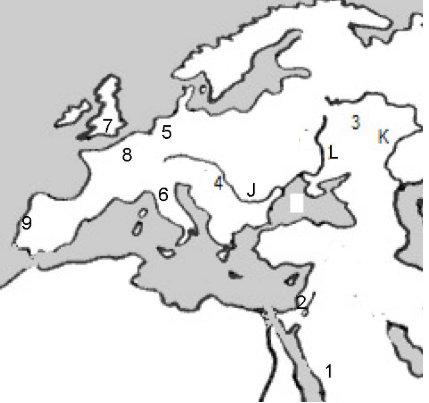
Match the number of the city or letter of the river with its name in the opposite column.
L and 8
L- Dnieper River
8- Paris
Known as "the Fair," the Capetian monarch who convened the first Estates General and precipitated the Avignon Papacy during his reign from 1285-1314.
Philippe IV
13th cen. Dominican priest and theologian associated with Scholasticism who authored the Summa Theologica.
Thomas Aquinas
Norman king who ruled England from 1066-87 after his victory at the Battle of Hastings.
William the Conqueror
Identify the year(s) of the following event:
Magna Carta
1215
Pope who exerted great political power via excommunication, interdiction, and inquisition during his papacy from 1198-1216.
Innocent III
Ayyubid general who conquered Jerusalem from the Crusaders in 1187.
Saladin
Identify the year(s) of the following event:
The Crusades
1095-1291
English monarch from 1272 to 1307 who conquered Wales and convened the first Model Parliament.
Edward I
Female French military leader at the Battle of Orleans during the Hundred Years War burned at the stake as a heretic and later beatified.
Joan of Arc
Identify the year(s) of the following event:
Hundred Years War
1337-1453
Identify the year(s) of the following event:
Bubonic Plague
1347-1351
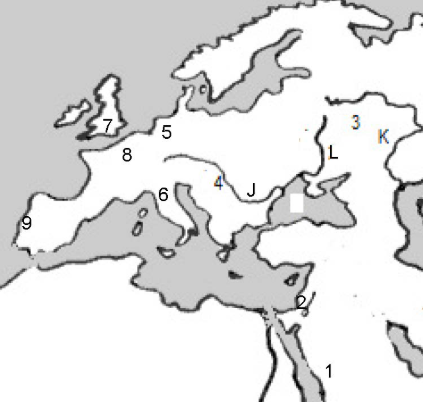
Match the number of the city or letter of the river with its name in the opposite column.
3,J, and K
3- Moscow
J- Danube
K- Volga
Renaissance polymath and painter of the Mona Lisa and the Last Supper.
Leonardo da Vinci
Printer from Mainz, Germany, who developed a movable type printing press in the 1440s.
Gutenberg
Florentine Renaissance artist best known for his sculpture of David and the ceiling of the Sistine Chapel.
Michelangelo
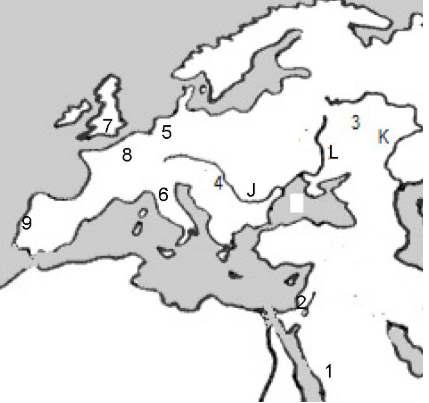
Match the number of the city or letter of the river with its name in the opposite column.
6
6- Florence
Spanish monarchs of Aragon and Castille who funded Columbus' first expedition and completed the Reconquista in 1492.
Ferdinand and Isabella
Ruler of the Ottoman empire at its height from 1520-66 who expanded its possessions to Budapest and the Persian Gulf.
Suleiman
13th century German king who founded the Habsburg dynasty.
Rudolf
15th century English civil war between the houses of Lancaster and York concluded by the establishment of the Tudor dynasty under Henry VII.
The Wars of the Roses
Identify the year(s) of the following event:
Battle of Kosovo
1389
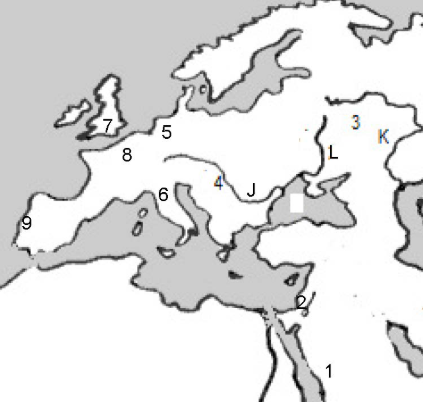
Match the number of the city or letter of the river with its name in the opposite column.
4
4 Budapest
"Virgin Queen" and last Tudor monarch of England who granted 1584 charter to Sir Walter Raleigh to discover and take possession of "remote, heathen and barbarous lands" in her name.
Elizabeth I
Portuguese explorer whose crew completed the circumnavigation of the globe in 1522 a year after his death.
Magellan
Spanish colonial official who led the conquest of the Aztec empire in 1519-21.
Cortés
Transfer of flora, fauna, and disease between the Americas and Eurasia after centuries of relative isolation.
Columbian Exchange
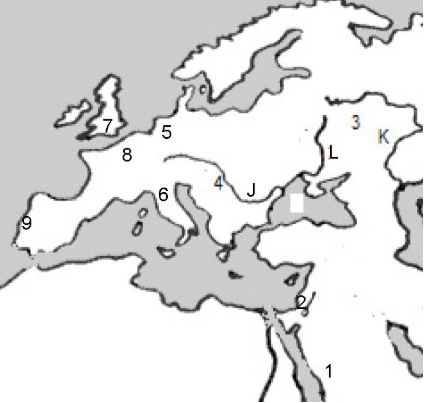
Match the number of the city or letter of the river with its name in the opposite column.
9
7
9- Lisbon
7- London
15th. cen. Dutch humanist whose writings are closely associated with both the Northern Renaissance and the Reformation.
Erasmus
Religious leader whose posting of 95 Theses in 1517 initiated the Protestant Reformation
Martin Luther
Swiss theologian whose positions on the office of the pope and predestination would inform what became Presbyterianism.
John Calvin
Broad name for the series of events in the 16th century resulting in the establishment of various Protestant sects in opposition to the Roman Catholic Church.
Reformation
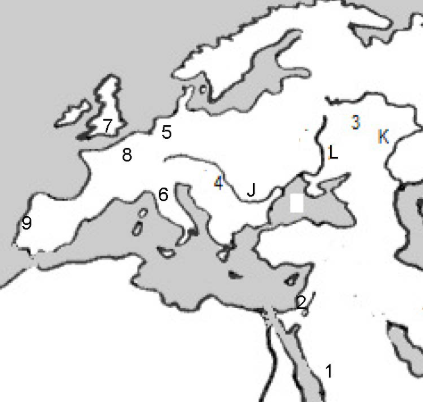
Match the number of the city or letter of the river with its name in the opposite column.
5
5 - Amsterdam
Place the following items in chronological order from first to last (there will be some overlap of some historical periods so choose the BEST answer):
The Protestant Reformation
Sumerian Civilization
Fall of the Western Roman Empire
Alexander the Great
The Black Death
Classical Greece
The Renaissance
Julius Caesar
The Neolithic Revolution
Phoenicians creating the alphabet
Neolithic Revolution
Sumerian Civilization
Phoenicians creating the alphabet
Classical Greece
Alexander the Great
Julius Caesar
Fall of the Western Roman Empire
The Black Death
The Renaissance
The Protestant Reformation
Period from 1480 to 1640 characterized by population growth in Europe, especially Northern Europe, urbanization, inflation, and climactic change.
Long 16th
Habsburg monarch of Spain from 1556 to 1598 who oversaw a declining economy, the onset of the Eighty Years War in the Netherlands, and a failed invasion of England.
Philip II
Period of high inflation beginning in the 16th century fueled by overextraction of silver and accumulation of royal debts.
Price Revolution
Name for a series of early 17th century conflicts in German kingdoms and municipalities between Protestant, Catholic, and foreign armies.
30 years war
Series of religious-fueled conflicts between Protestant Huguenots and the French monarchy resolved by the accession of Henry IV to the throne in 1589.
Wars of Religion